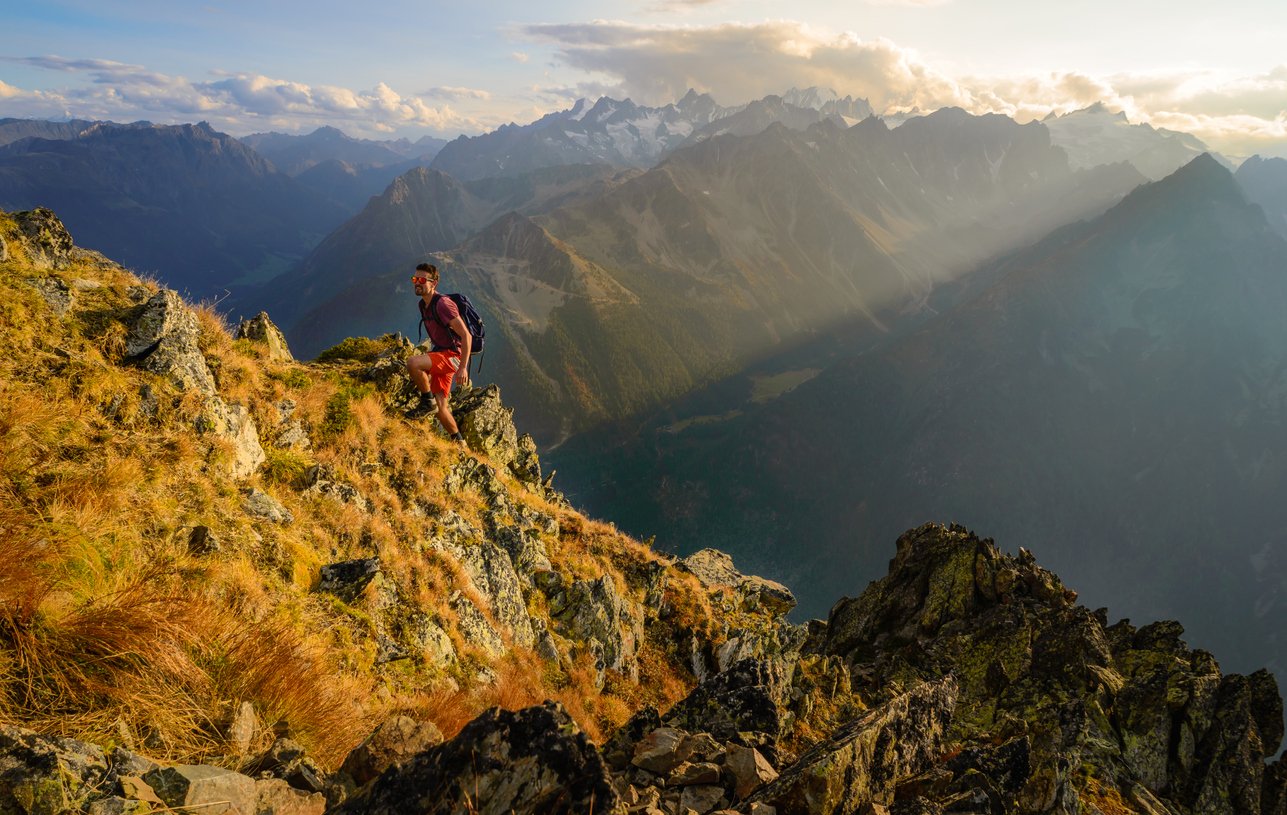
Hiking vs trekking. What’s the difference? Is there even a difference between hiking and trekking? Is it an age old rivalry, like England vs Scotland and maps vs GPS tracking systems? Or are they both the same thing? Like taps vs faucets? And maps versus… umm… some other maps?
If you look at the definitions of 'hiking' and 'trekking', you'll see that they are very similar - both refer to the act of walking. However, 'trekking' and 'hiking' aren't considered synonymous; they have different connotations. We'll discuss those, so you never need be confused again (about the difference between hiking and trekking that is. You’ll probably still be confused about something else at some point in your life. Sorry).
The Definitions of Hiking and Trekking
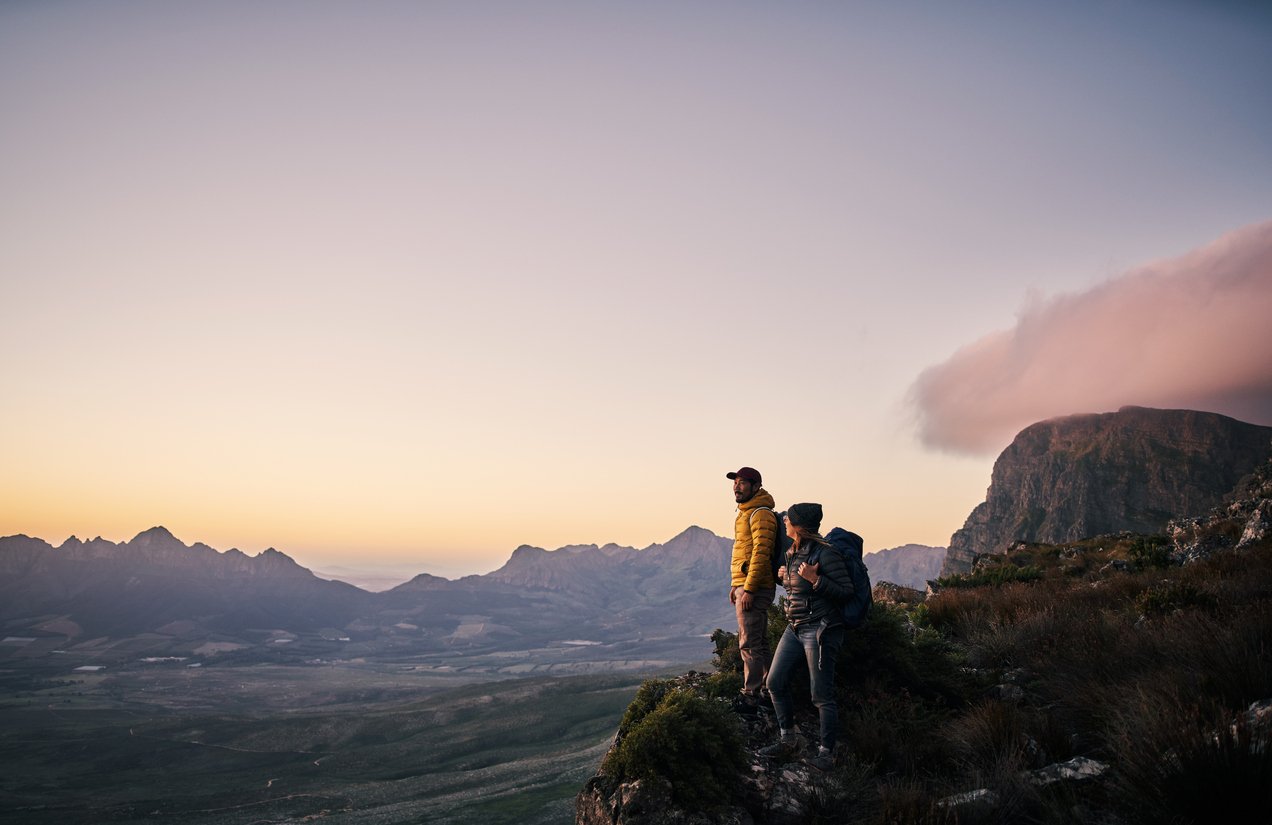
To understand the difference, or lack thereof, between hiking and trekking, we thought it’d be useful to first provide you with the definition of each, straight from the Oxford English Dictionary – the (disputed) King of Dictionaries.
Here’s how the dictionary looks at the different meanings between hiking and trekking:
- Hiking: “the activity of going for long walks, especially across country”.
- Trekking: “to go on a long arduous journey, typically on foot”.
So, as far as the dictionary is concerned, there is little difference when it comes to hiking vs trekking. Trekking is emphasised as slightly more demanding than hiking, though. Whereas the definition of hiking includes the word “walk”, something typically seen as jovial, easy and pleasant, trekking is defined as a “journey”, which is typically something that is more challenging, requires more effort and that tends to take more than one day.

In the modern world, this has led to hiking often being used to talk about day hikes and trekking being used to talk about multi-day hikes in more challenging environments. More on that below.
Trekking Vs. Hiking
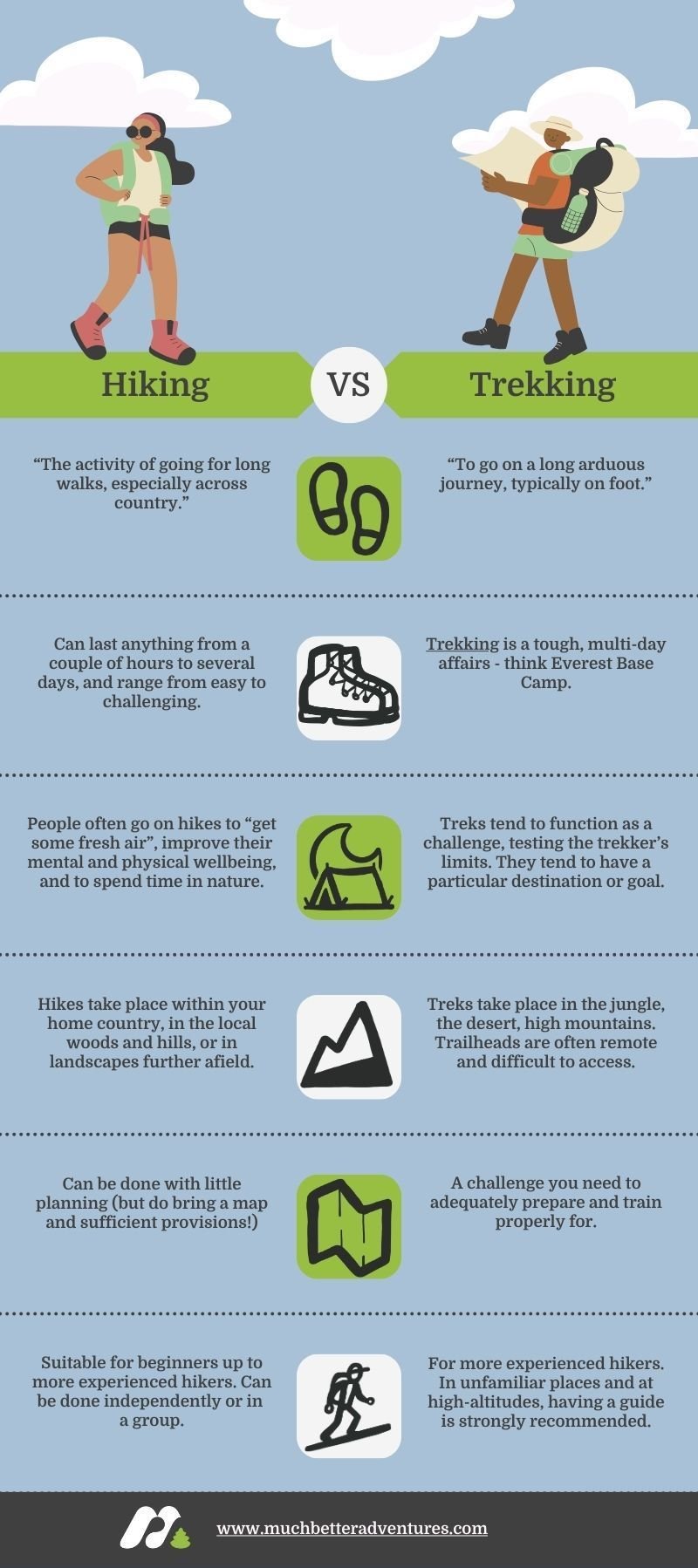
In the modern world, the terms hiking and trekking have taken on slightly different meanings. Basically what’s happened is people have taken the minuscule differences in those definitions above and stretched them out a little bit more. Here, we break down some of the differences.
Duration
When your outdoorsy friend refers to hiking, they'll likely be talking about a walk which lasts anything from several hours to several days. Treks, meanwhile, are always considered to be multi-day journeys (think the Everest Base Camp trek). They involve at least a couple of days on the trail, but often can involve many days, weeks or months on the trail.
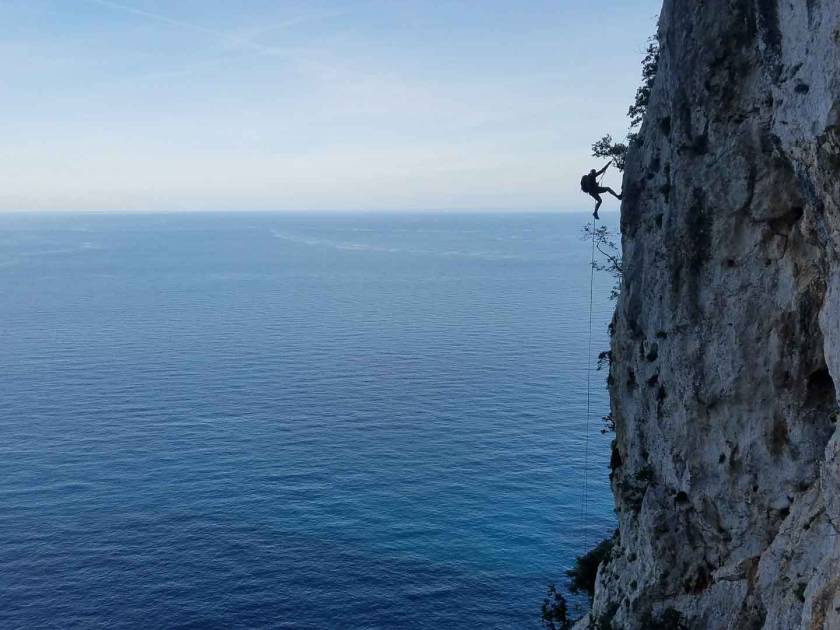
Challenge Level
We tend to think of hikes as walks that aren't overly stressful, even if they're multi-day affairs. You might be pleasantly tired after a day on the trail, but you won't have pushed yourself to your mental and physical limits. A trek, meanwhile, is far more of a challenge - a journey with a goal or a destination in mind.
Terrain
Hikes and treks take place over all sorts of terrain - the whole point of either tends to be that you get out into great natural beauty. A yomp through your local woods or hills would be considered by most people to be a 'hike'. However, 'trekking' refers to walks in more demanding terrain - think the high altitude trails of the Annapurna Circuit, or trekking through Colombian jungle to the Lost City.
As a result of the time spent on the trail, in terms of location, treks tend to go to places that are a lot less accessible than hikes. This is why they tend to be more arduous.
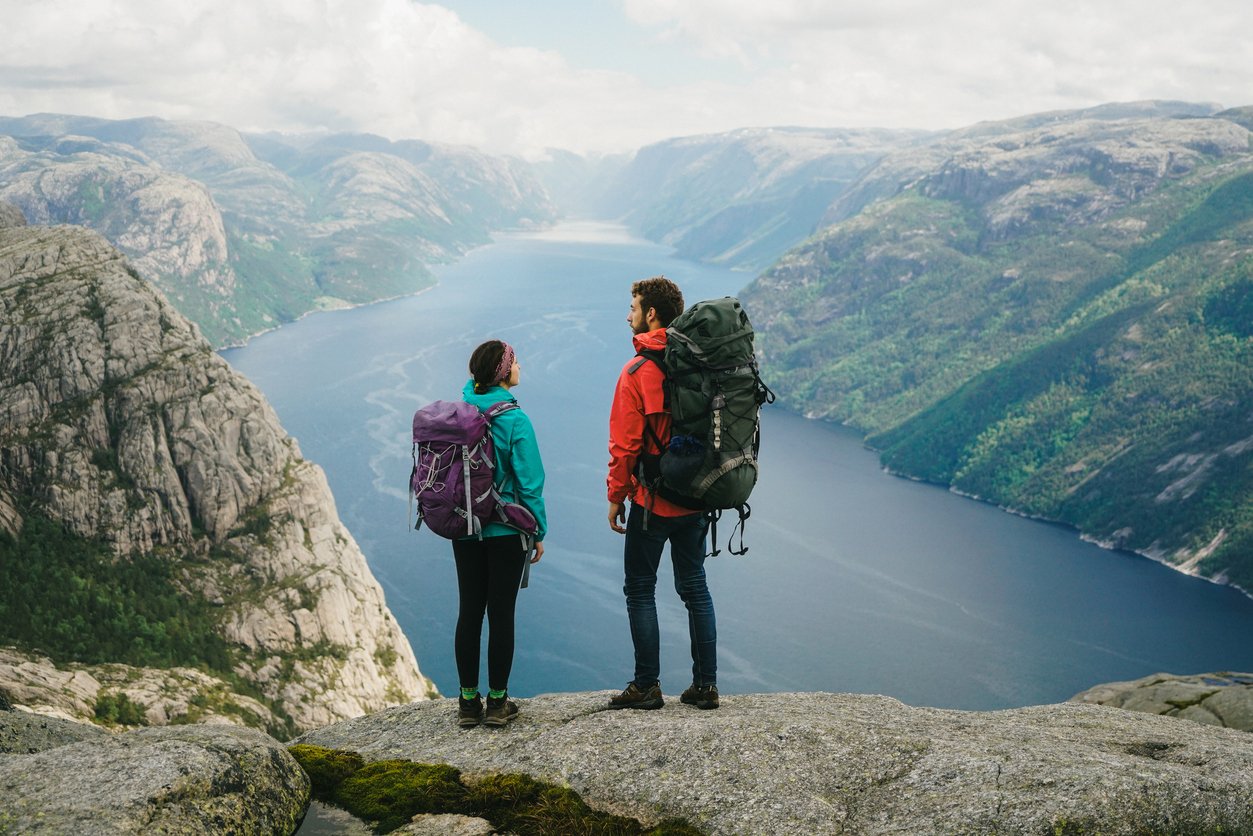
Expertise Level
Hikes tend to be more beginner-friendly than treks, especially those only a couple of hours long. You can hike solo, or with a small group of friends. However, we'd urge you to be well-prepared on even the shortest of hikes, with adequate gear, a map and sufficient hiking snacks.

Treks are more difficult, requiring an adequate level of physical fitness and mental preparation. However, don't be put off - beginners can still hit the trail if they train for a multi-day trek. Due to the remote, arduous nature of treks, we'd highly recommend you undertake them with a guide, especially if you're a beginner.
Hiking vs Trekking vs Backpacking
The way these terms are used is dependent on what country you come from. By and large, if someone is doing a multi-day hike far from home, on the other side of the world, they’re much more likely to call it a trek, whereas they may call a similar trek in their home country a hike.
However, in the UK, 'backpacking' is often used to describe people engaged in long term travel, often through multiple countries. In the US, 'backpacking' is hiking while carrying everything you need for survival on your back, whereas if you were trekking, you might have porters to carry your equipment for you, or be going hut-to-hut and using the facilities each night - in the UK, all of these examples would fit under the definition of 'trekking'.
Hiking vs Trekking: Equipment
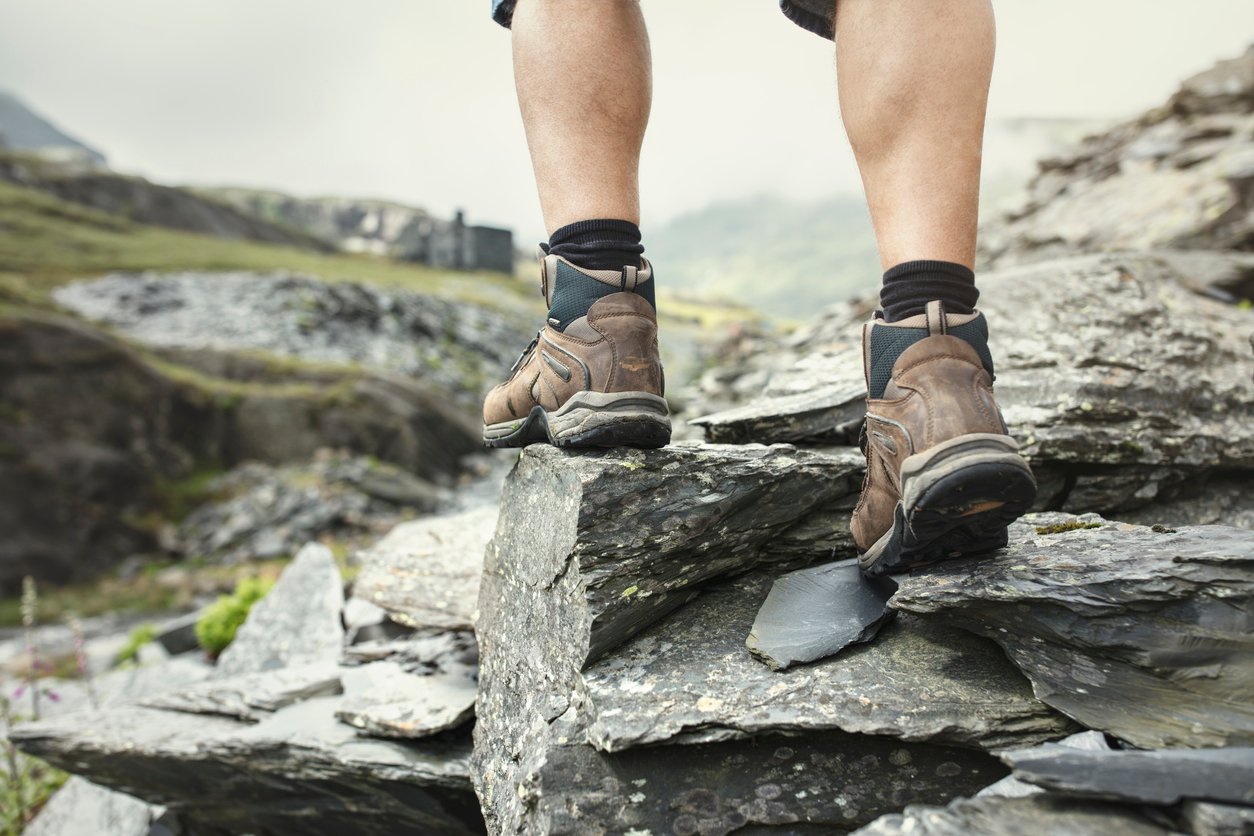
As both hiking and trekking involves getting out into the great outdoors and often getting off the beaten path, the equipment tends to be quite similar for either. You’ll need everything you’d normally need to get out into nature – good hiking boots, waterproof gear, a good rucksack, walking poles, snacks and so forth for both.
Hiking vs Trekking Shoes
For a trek, you'll need sturdy, worn-in hiking boots with ankle support. You'll want them to be waterproof and you might even need them to be crampon compatible.
For a hike, you'll also need decent footwear - sturdy hiking shoes, trail running shoes or hiking boots. For longer hikes, we'd also emphasise the importance of ankle support.
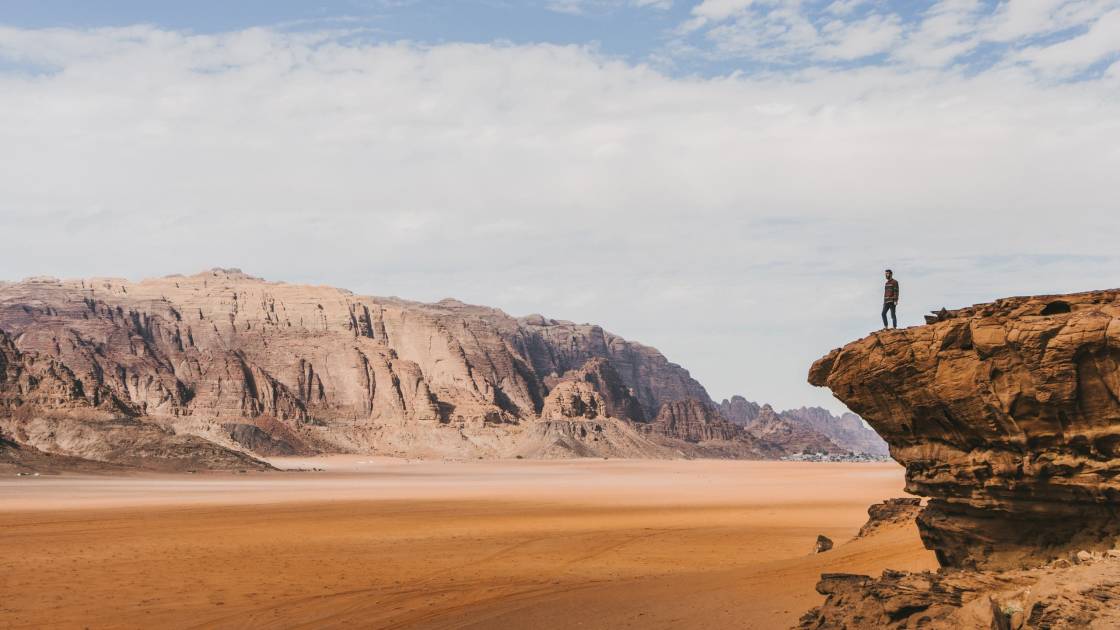
Trekking Gear
With trekking you’re likely to be out on the trail longer, so you are more likely to have a tent, sleeping bag and mat. You're also more likely to be looking for lightweight gear, so your pack isn't too heavy; or to need survival gear or anti-smelling, multi-use clothing along with you.
It's important to emphasise that you shouldn’t base your equipment on whether your adventure is being referred to as a trek or a hike, though. Any outdoor multi-day walk in the wild requires speciality gear and that gear is dependant on the terrain, the accessibility to shelter, your sustenance requirements, the weather conditions and your physical needs.
The bottom line here is that whether it’s called a trek or a hike, in essence, isn’t particularly important when it comes to what equipment you’re going to need to bring with you. It’s all about what you’ll be doing and where you’ll be doing it.
Inspired? Check out our hiking and trekking adventure holidays and get yourself outdoors!


